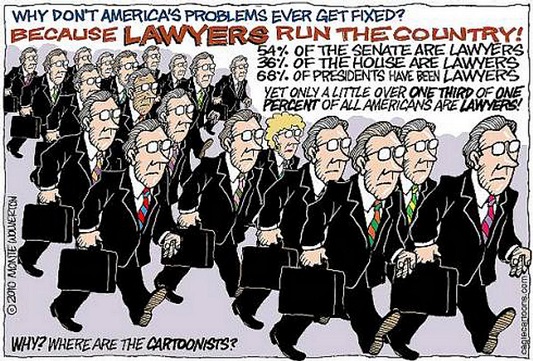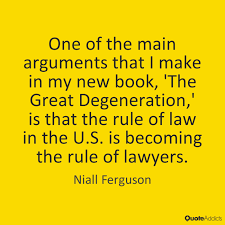America Needs Fewer Lawyers in Politics
 “Year upon year we do nothing to govern our elite litigators, and the result at length is that they have decided to govern us,” writes Walter K. Olson in The Rule of Lawyers: How the New Litigation Elite Threatens America’s Rule of Law.
“Year upon year we do nothing to govern our elite litigators, and the result at length is that they have decided to govern us,” writes Walter K. Olson in The Rule of Lawyers: How the New Litigation Elite Threatens America’s Rule of Law.
The book cover provides key questions issuing from this classic text: “Who picks these lawyers, and who can fire them? Who protects the public’s interest when settlements are negotiated behind closed doors? Where are our elected lawmakers in all this? The answers may determine whether we slip from the rule of law to the rule of lawyers.”
Voters in some states are being asked if we should get rid of party affiliations in favor of name recognition from yard signs and television ads. Might it be more in the interests of democracy if we identified candidates as attorneys or not?
A lot of time has elapsed since the Constitution and Articles of Confederation were written. What a law might have meant back then doesn’t matter. These days, laws can be changed arbitrarily to reflect just about any new interpretation, dismissing the original intent as out-of-date.
Olson observes that “It is generally acknowledged that American politics offers few power bases more attractive than that of a state attorney general.” Political independence might seem good at first: “Running on a separate statewide ballot line of their own, most attorneys general cannot be fired by their state’s governor, a contrast with the subservience of the U.S. attorney general to the president at the federal level.”
But once the attorney general of each state is seen as just one player in a lawyer-dominated political machine, the appearance of independence quickly disappears. Even the US Supreme Court is seen as subservient to the president who does the picking.
No one worries any more about Freemasonry as a sinister political force, but a similar legal cabal goes unobserved in our society, complete with an obscurantist language, but one that can be easily explained once a fee is paid. Endless due process appeals insure that rank-and-file attorneys remain gainfully employed just in case they don’t
run for political office.
 The problem is actually more systemic according to historian Niall Ferguson in The Great Degeneration: How Institutions Decay and Economies Die (2014).
The problem is actually more systemic according to historian Niall Ferguson in The Great Degeneration: How Institutions Decay and Economies Die (2014).
 “Year upon year we do nothing to govern our elite litigators, and the result at length is that they have decided to govern us,” writes Walter K. Olson in The Rule of Lawyers: How the New Litigation Elite Threatens America’s Rule of Law.
“Year upon year we do nothing to govern our elite litigators, and the result at length is that they have decided to govern us,” writes Walter K. Olson in The Rule of Lawyers: How the New Litigation Elite Threatens America’s Rule of Law. The problem is actually more systemic according to historian Niall Ferguson in The Great Degeneration: How Institutions Decay and Economies Die (2014).
The problem is actually more systemic according to historian Niall Ferguson in The Great Degeneration: How Institutions Decay and Economies Die (2014).